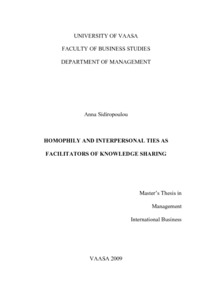HOMOPHILY AND INTERPERSONAL TIES AS FACILITATORS OF KNOWLEDGE SHARING
Sidiropoulou, Anna (2009)
Kuvaus
Opinnäytetyö kokotekstinä PDF-muodossa.
Tiivistelmä
Interpersonal relationships depend a lot on interpersonal similarities. Common characteristics between individuals, such as language, culture, religion, geographic area, proximity or shared experiences tend to compose a fertile soil for relationships to develop. People, by nature, have a tendency to register themselves in small groups that they share something in common with. The phenomenon of similar people sticking together is coined as homophily. According to research, interpersonal similarity drives effective knowledge sharing, while interpersonal differences create difficulties in knowledge sharing.
The aim of this thesis is to explore the role of homophily in the creation of interpersonal network ties and the impact of homophily, on knowledge sharing processes within a cross-cultural environment. The study is based on 9 semi-structured interviews. The respondents were chosen so that they shared some characteristics such as all being foreigners working in Finland, in international companies, where English is used as the corporate language. However, their population was diverse, in context of country of origin, sex and occupation, in order to provide an otherwise random sample.
The study shows that interpersonal homophily is responsible for the creation of ties. More homophily creates stronger ties, while less homophily weaker ones. Strong ties are facilitators of effective knowledge sharing while weak ties slow down knowledge sharing. Moreover, the study confirmed the paradox of homophily, as it can also become a barrier to effective knowledge sharing, when strongly homophy-oriented individuals are not exposed to external stimuli and new experiences.
The aim of this thesis is to explore the role of homophily in the creation of interpersonal network ties and the impact of homophily, on knowledge sharing processes within a cross-cultural environment. The study is based on 9 semi-structured interviews. The respondents were chosen so that they shared some characteristics such as all being foreigners working in Finland, in international companies, where English is used as the corporate language. However, their population was diverse, in context of country of origin, sex and occupation, in order to provide an otherwise random sample.
The study shows that interpersonal homophily is responsible for the creation of ties. More homophily creates stronger ties, while less homophily weaker ones. Strong ties are facilitators of effective knowledge sharing while weak ties slow down knowledge sharing. Moreover, the study confirmed the paradox of homophily, as it can also become a barrier to effective knowledge sharing, when strongly homophy-oriented individuals are not exposed to external stimuli and new experiences.
